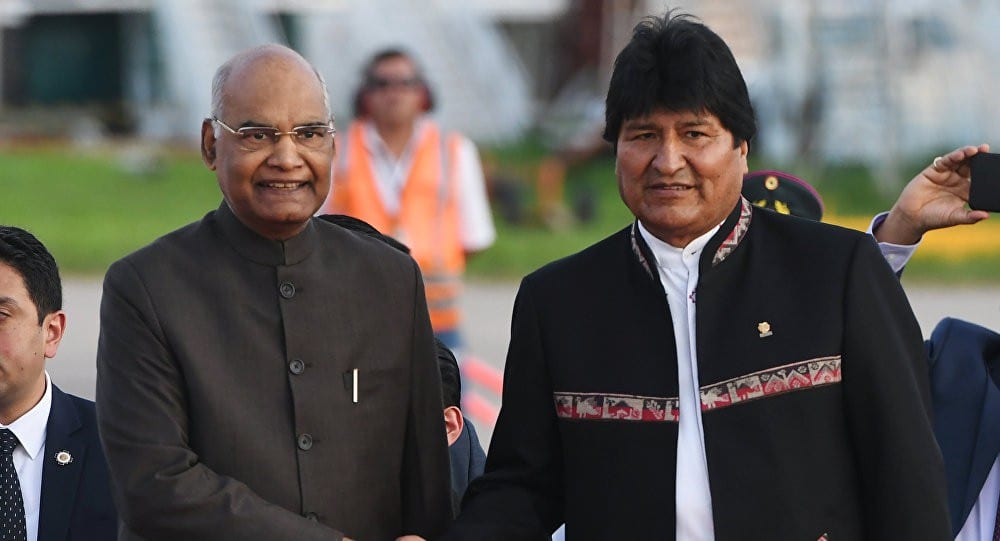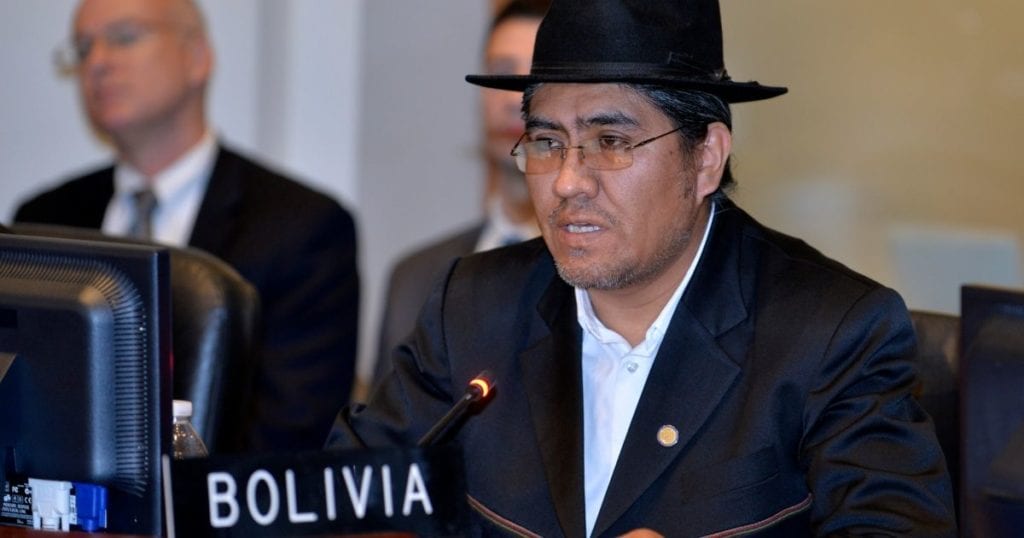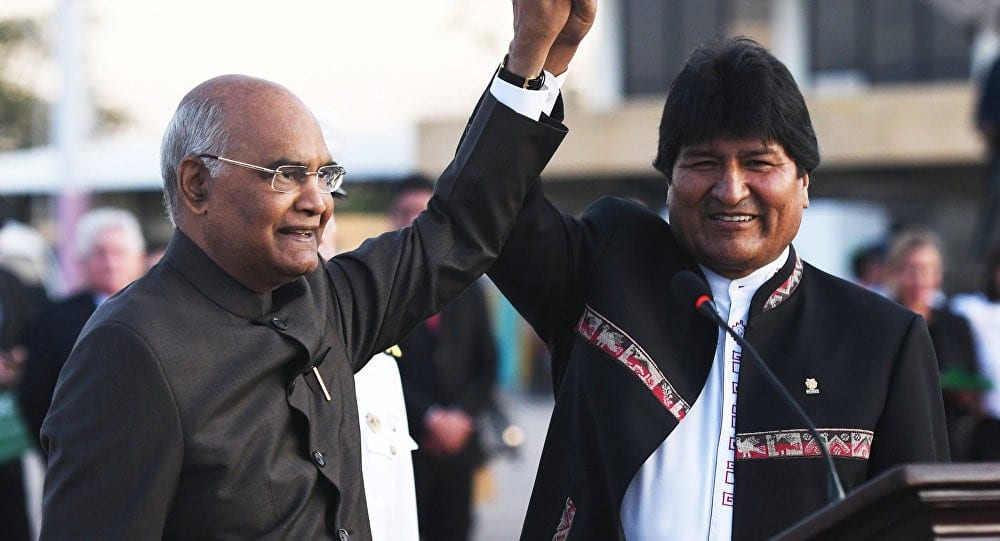
One of the most significant events of the past week in the Latin American region was the long-awaited visit of the President of India to the Plurinational State of Bolivia. The historic meeting of Evo Morales and Ram Nath Kovind was broadcast and actively discussed by all Latin American media. The channel “Telesur” called the visit of the head of the Indian state to the Andean country a real breakthrough of Bolivian diplomacy. What is the memorable meeting between the two leaders? How will this visit affect the development of Bolivian cooperation with one of the most powerful economies of the modern world?
This time, the foreign “tour” of the President of India began with Croatia and will end in Chile. Bolivia has become one of the countries that for the first time hosted the Indian leader. In preparing the visit, the foreign affairs agencies of the two countries identified the main topic of the agenda – India’s interest in the export of lithium from Bolivia. At the moment, Bolivia ranks first in the world in terms of lithium reserves. The main field of the state is the largest salt lake on the planet – the Uyuni salt lake, which occupies an area of 10 thousand 582 square kilometers. With such indicators, the concentration of lithium exceeds the average values several times. Many researchers estimate the approximated reserves from 5 to 9 million tons. At the same time, the Uyuni salt is not the only lithium deposit in the country.
India is currently implementing an innovative program for the development of electric transport, in which, by 2030, at least 30% of its vehicles will have to be operated with electric batteries, for which lithium is one of the main components. Today, India is discussing opportunities for cooperation in the production of lithium also with another Latin American country – Argentina, which is one of the three leaders among the largest producers.
On March 28, Ram Nath Kovind arrived at the airport of Bolivian industrial “heart” – Santa Cruz de la Sierra. Together with the President of India, 40 businessmen flew to Bolivia, who over the course of two days held about a hundred meetings with local businessmen.
On March 29, a historic meeting of the two leaders took place. The Indian President noted the importance of this visit and the special welcome given to the delegation of India. From the very beginning, Kovind expressed great pleasure in staying in Bolivia, a country rich in its cultural diversity. The agenda of the President of India in the Latin American state was quite intense. The leaders of the two countries were able to discuss a wide range of issues, among which the most crucial were such topics as Bolivian-Indian cooperation in the development of the pharmaceutical industry, the possibility of collaboration in the field of lithium mining in Bolivia, and interaction in the gas sector. During his visit, Kovind assured that India and Bolivia signed a pact on creating new “corridors” of mutual growth and prosperity.
The business round of negotiations between Bolivian entrepreneurs and representatives of India took place over two days and was marked by a high degree of bilateral interest in the areas of the automotive industry, the textile industry and the production of innovative medical products on Indian technology in Bolivia.
After the completion of fruitful negotiations between the two leaders, the Bolivian President Evo Morales (Spanish – Juan Evo Morales Ayma) confirmed India’s intention to invest about $ 13 billion in the development of the hydrocarbon sector of Bolivia. According to the head of the Bolivian state, such investments are planned to be spent on the construction of a gas pipeline leading to the port of Ilo, which Bolivia rented from Peru in 2010. The contract lasts for 99 years. The main goal of building a liquefied natural gas plant in the port town will be to export gas to other continents, such as Asia, across the Pacific Ocean. Morales also stressed that the final agreement, signed at the end of the visit of Kovind to Bolivia, consists of eight points, which are related to the extraction of lithium, the development of cooperation in the fields of health and hydrocarbons.
Evo Morales noted that during the visit of the President of India, a loan agreement was signed for additional investments in the amount of about $ 100 million for the development of drugs aimed at combating cancer. Other agreements signed between Bolivia and India provide for the strengthening of the lithium industry, given that Bolivia plans to build more than 40 plants by 2030 that will operate on evaporate resources.
The leader of the Latin American country highly appreciated the degree of effectiveness of the visit of the President of India, who first arrived in Bolivia. Morales expressed the hope that now the world powers will more often turn their eyes towards his state. According to him, the economy of Bolivia, which has been steadily demonstrating its growth over the past few years, thanks to the model used for its development, is becoming increasingly attractive for partners from other countries.

On 1 April, the Bolivian Foreign Minister Diego Pary (Spanish – Diego Pary Rodríguez) gave an extensive interview to the leading Latin American media. He stressed the importance of the visit of the Indian leader, who managed to lay the foundations for a “promising” future for bilateral cooperation in order to grow the integrated development of both countries. According to Pary, the agreements signed between Bolivia and India on March 28-29 cover health care, technology, mining, transport, culture, diplomatic relations, and others.
In addition, Diego Pary announced that India will open its embassy in Bolivia in the coming months in order to develop joint projects and consolidate investments in the productive sectors of Bolivia. Pary noted that after the visit of the President Kovind to Bolivia, both countries began a “new era in bilateral diplomatic relations”.
Summing up the visit of Ram Nath Kovind to Bolivia, it is worth remembering that the indicator of bilateral trade between Bolivia and India, according to official data for the period 2016-2017, amounted to 314,684 million US dollars. The main products exported by India to Bolivia over the past 4 years are automobiles, iron and steel, pharmaceuticals, machinery, rubber and plastic products, threads and textiles. The main products imported by India from Bolivia are still gold, silver, leather and fodder crops. In addition, bilateral contacts were marked by one scandalous history. In 2007, the Indian company “Jindal Steel & Power Ltd.” received a contract to develop the Bolivian iron mine “El Mutún”. The company announced that it will invest $ 2.3 billion in the creation of a steel plant, which at that time was the largest direct investment of foreign capital in the history of Bolivia. Subsequently, the company closed the project in July of 2012, accusing the government of Bolivia of not fulfilling its “contractual obligations”. In August of 2014, the International Chamber of Commerce ruled in favor of “Jindal” and ordered the Bolivian state-owned mining company “Empresa Siderúrgica del Mutún” to pay the Indian “Jindal” compensation in the amount of $ 22.5 million. However, according to the world’s leading observers, it is still worth forgetting the conflicts of bygone years, because the meeting of Morales with Kovind will surely give a new powerful impetus to the development of Bolivian-Indian relations.


